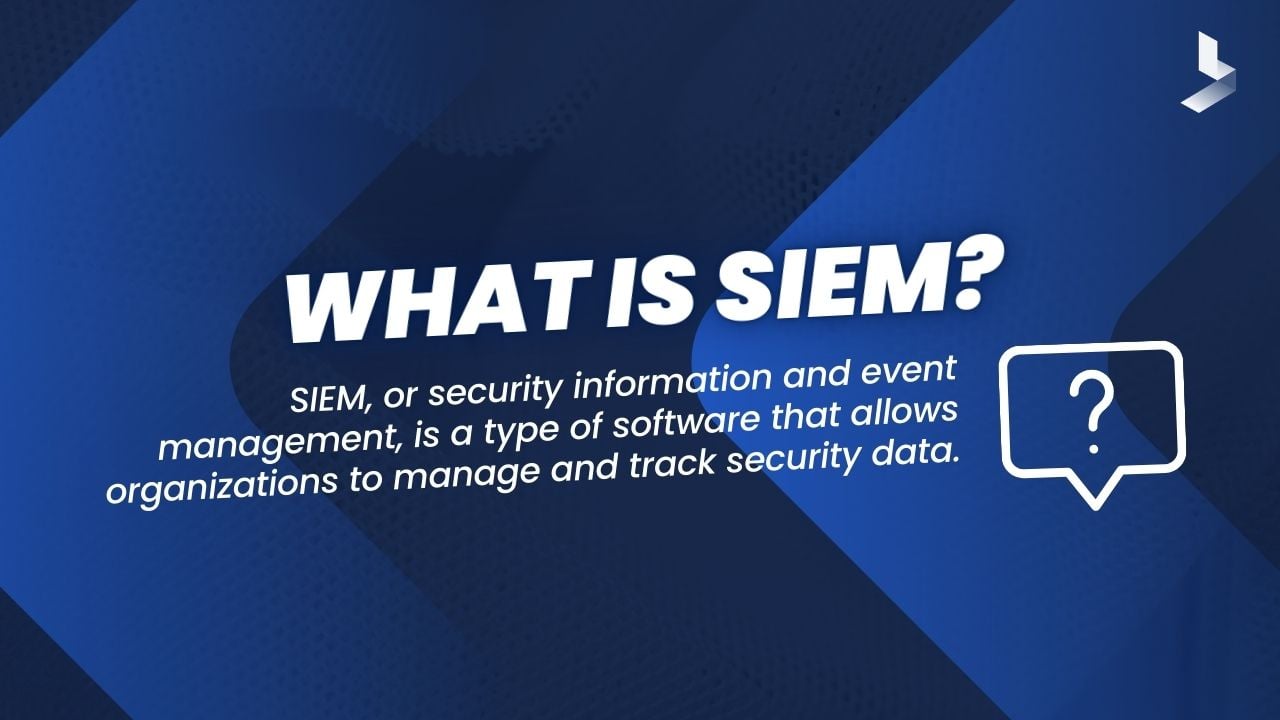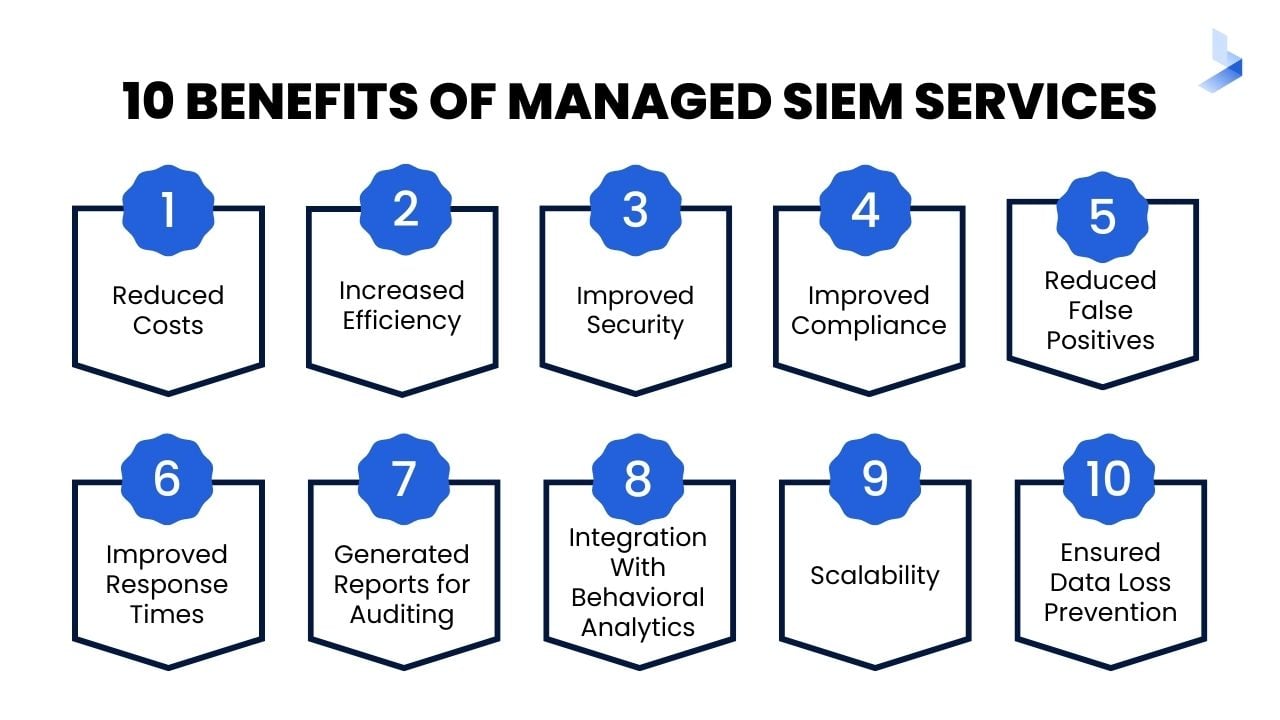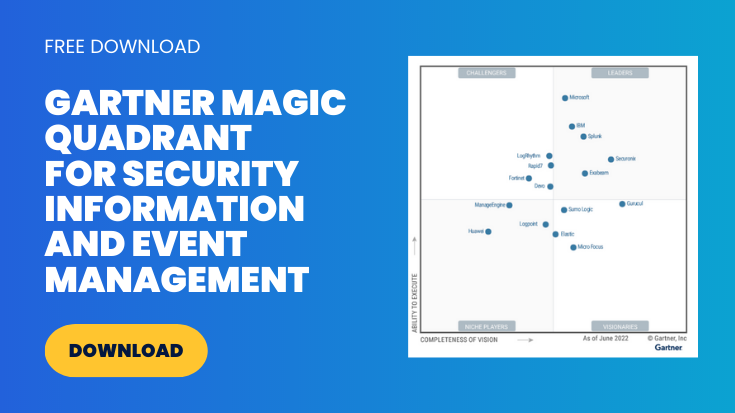Top 10 Benefits of Managed SIEM Services

 By
Emily Miller
·
13 minute read
By
Emily Miller
·
13 minute read
As a professional responsible for your company's data security, you likely understand the crucial role Security Information and Event Management (SIEM) plays in fortifying your defense strategy.

However, managing a SIEM solution on your own can be challenging, especially if you lack the time or resources, which is often the case for businesses grappling with these common cybersecurity challenges.
This is where managed SIEM services enter the picture. In this guide, we will explore the numerous advantages of these services, empowering you to make an informed decision on whether they are the right fit for your business.
Continue reading to uncover the potential and benefits of managed SIEM services, and learn how embracing this opportunity can significantly enhance your organization's security posture.
What Is Security Information and Event Management?
Before we dive into the benefits of managed SIEM services, let's take a step back and review what SIEM is and why it's so important.
SIEM is a security solution that collects data from all aspects of your IT environment (including network devices, applications, servers, etc.) and uses that data to provide real-time visibility into your system for security purposes.
This data can be used to identify potential threats, track changes in your system, and even help with incident response. All are potential necessities for most businesses with an online component.
There are two main components to any SIEM solution: a log management platform and an analytics engine. They are both equally important, as one doesn't necessarily work without the other.
The log management platform is responsible for collecting data from all of your devices and storing it in a central location. The analytics engine then takes this data and analyzes it to look for potential security threats.
SIEM is used by organizations of all sizes across all industries. Any company that needs to comply with security standards like PCI, DSS, or HIPAA or that simply wants to improve its overall security posture can benefit from SIEM.

What Is the Future of SIEM?
The SIEM market is expected to grow at a compound annual growth rate of 11% from 2019 to 2024, according to MarketsandMarkets research.
This growth is being driven by the increasing complexity of IT environments. There's also the need for real-time visibility into corporate data and stringent regulations (such as GDPR and HIPAA).
As the SIEM market grows, we expect to see more companies opting for managed SIEM services. Managed services providers (MSPs) can effectively manage a SIEM solution. This frees up internal staff to focus on other projects.
In addition, MSPs can often provide SIEM solutions at a lower cost than companies could on their own. Let's take a look at the benefits of SIEM, of which there are plenty.
4 Reasons to Consider Managed SIEM Services
With managed SIEM services, the company itself doesn’t have to do any of the workload. Instead, it’s all taken care of by the third-party provider.
Managed SIEM services offer companies a range of cybersecurity services. The most important of these is log management. Log management is where the provider takes security data from across your company’s network, feeds it through its SIEM system, and then organizes all the events data into a pattern which it can then use to identify threats, deal with issues, and provide reports for auditing.
Reason 1: Asset Discovery
Managed SIEM services also do something else that’s important: asset discovery. Companies don’t often know what assets they have or what data they need to protect. With asset discovery, BitLyft will itemizes all your data and systems and bring it all under a single umbrella. No part of your network is cut off.
Let’s take a look at three reasons why you might consider managed SIEM services.
Reason 2: You Lack Adequate Resources
Most small to mid-size companies don’t have the resources to perform all of the functions that managed SIEM services offer. A small company may not have any dedicated IT professionals at all. Even if it does have some, they are probably already busy dealing with other IT issues. This could include implementing new software strategies and researching the best product stack for company operations. Often, there just isn’t time in the day to monitor all network events and respond to them individually.
One of the jobs of IT professionals is to identify vulnerabilities in the company network and resolve them. But with limited resources and growing IT scope at many companies, CIOs often don’t have the resources to dedicate to identifying vulnerable systems. Again, this is something that third-party managed SIEMs can do. They scan your network to find weak points and then take measures to address them, making a breach less likely over the long-run.
Reason 3: You Lack Time
Getting up to speed with a complex SIEM product takes a lot of time. Each product is different, and IT professionals may have to dedicate entire days or weeks to learn how to use it effectively. Also, the software itself is demanding on a company’s labor time. Cybersecurity personnel have to physically sit there monitoring logs and investigating threats since most SIEM systems don’t do this automatically.
If you run a small business, you need your IT professionals doing the highest value-added tasks, not focusing on monitoring networks. A lack of time, therefore, is why many firms choose a managed approach.
Managed SIEM services can do things like behavioral monitoring and spot unusual activity on the network quickly. Third-party operators can inform you of suspicious behavior and immediately alert you. This helps you to eliminate issues as soon as they arise.
Reasons 4: You Lack Budget
Hiring IT employees to sit and monitor your network is expensive. It’s something that only the largest and most lucrative companies can bring in-house. Most companies, therefore, choose a managed solution instead. Managed SIEM services are much less expensive than paying a full-time salary to a new member of staff but they offer many of the same benefits.
Managed SIEM services rely on teams of dedicated analysts who spread their time across multiple clients. Smart software feeds events to these analysts who then analyze it and send reports to companies. Often, managed SIEM services will perform actions to protect your network on your behalf.
What’s interesting about managed SIEM services is that they can help improve productivity at your company as well as security. Suppose, for instance, that you use a managed SIEM provider to manage your company’s firewall. Firewalls are great for keeping out unwanted traffic, but they have a nasty habit of blocking lots of things that would like to be able to go in and out of your network – such as traffic that has not been categorized good or bad yet, or an attack method that the firewall isn’t aware of yet..
Managed SIEM services can update firewall settings, along with other security settings across your IT landscape, allowing vital information to get through while at the same time tweaking the system so that you aren’t inundated with malware and viruses. Managed SIEM can help you capitalize on all your priorities and ensure that you can take advantage of maximizing your IT resources.
10 Benefits of Managed SIEM Services
Managed SIEM services offer a plethora of advantages to organizations seeking a robust and efficient security solution. By entrusting your security management to a team of dedicated experts, you can reap the benefits of their skills and knowledge in handling evolving cybersecurity challenges. In the following top 10 list, we will delve deeper into the compelling reasons for choosing managed SIEM services as a vital component of your organization's cybersecurity strategy.
1.) Reduced Costs
One of the biggest benefits of managed SIEM services is that they can help reduce your overall costs. When you outsource the management of your SIEM solution to a third-party provider, they will handle all of the upfront costs associated with setting up and maintaining your system.
This can save you a significant amount of money, especially if you don't have the internal resources to manage a SIEM solution on your own.
2.) Increased Efficiency
Another benefit of managed SIEM services is that they can help increase your overall efficiency. Effective business processes result in more time in revenue-increasing activities.
When you have a team of experts managing your SIEM solution, they can quickly identify and resolve any potential issues. This can free up your time to focus on other important tasks and help ensure that your system is always running smoothly.
3.) Improved Security
Perhaps the most important benefit of managed SIEM services is that they can help improve your overall security posture. It is the primary reason anyone would be interested in security features in the first place.
When you outsource the management of your SIEM solution to a third-party provider, they will have the expertise. This can give you peace of mind knowing that your data is safe and secure.
4.) Improved Compliance
Another benefit of managed SIEM services is that they can help improve your compliance posture. When you outsource the management of your SIEM solution to a third-party provider, they will be responsible. They must ensure that your system meets all compliance requirements.
This result will also reduce the risk of non-compliance, so managed SIEM services may be right for you.
5.) Reduced False Positives
One of the benefits of managed SIEM services is that they can help reduce false positives. False positives are when the SIEM solution flags something as a potential security threat when there is no actual threat.
This can waste time and resources, as well as create unnecessary stress for employees. When you outsource the management of your SIEM solution to a third-party provider, they will help you. They have the necessary tools to properly configure your system to reduce false positives.
6.) Improved Response Times
Another benefit of managed SIEM services is that they can help improve your response times to potential security threats. That is practically their sole purpose at the end of the day.
They will have the expertise and resources necessary to identify and resolve any potential issues quickly. This can help ensure that your system is always running smoothly and help reduce the overall risk to your organization.
7.) Generated Reports for Auditing
Another benefit of managed SIEM services is that they can help generate reports for auditing purposes. Auditing is very important when it comes to cyber security for your business.
When you outsource the management of your SIEM solution to a third-party provider, they will be responsible for generating reports on a regular basis. This can help you stay compliant with all relevant regulations and ensure that your system is always running smoothly.
8.) Integration With Behavioral Analytics
Another benefit of managed SIEM services is that they can help integrate with behavioral analytics. Behavioral analytics is a type of security solution that uses machine learning to identify potential threats.
When you outsource the management of your SIEM solution to a third-party provider, they will be responsible for integrating it with your behavioral analytics solution. This can help improve your overall security posture and help reduce the overall risk to your organization.
9.) Scalability
One of the benefits of managed SIEM services is that they can help scale your system as needed. When you outsource the management of your SIEM solution to a third-party provider, they will be responsible for scaling your system.
Scalability will help ensure that your system is always running smoothly, but also make it effective for the future.
10.) Ensured Data Loss Prevention
Another benefit of managed SIEM services is that they can help ensure data loss prevention. Data loss prevention is a type of security solution that helps prevent sensitive data from being lost or stolen.
When you outsource the management of your SIEM solution to a third-party provider, they will be responsible for ensuring that your system meets all data loss prevention requirements. This will help reduce the overall risk to your organization.

Is SIEM Expensive?
The cost of managed SIEM services will vary depending on the size and complexity of your organization. However, when you compare the cost of managed SIEM services to the cost of hiring in-house staff, you will find that managed SIEM services are generally more cost-effective.
This is because when you outsource the management of your SIEM solution to a third-party provider, there are caveats. They will be responsible for all aspects of your system, including maintenance, upgrades, and support. As such, you will not have to bear the brunt of these costs yourself.
Furthermore, when you compare the cost of managed SIEM services to the cost of hiring in-house staff, it's evident. You will find that managed SIEM services are generally more efficient.
This is because when you outsource the management of your SIEM solution to a third-party provider, they will have the expertise. They will also have the resources necessary to properly configure and maintain your system.
Now that we've answered the question "what is SIEM?" and discussed the future of SIEM, let's take a look at how you can optimize your utilization of SIEM services. Here are some tips:
Research Tip
If you're considering managed SIEM services, be sure to do your research and find a reputable provider with experience in your industry. Ask for references and read online reviews to get an idea of what other companies think of their service.
Moreover, make sure to have a clear understanding of your organization's needs before signing up for any service. This will help ensure that you're getting the most out of your investment and that the provider you choose is able to meet your specific needs.
Understanding Tip
Make sure you understand what data your SIEM solution will collect and how it will be used. This will help you determine if the solution is right for your needs and ensure that you're getting the most out of it.
In addition, be sure to review your SIEM solution's privacy policy to make sure it meets your company's requirements.
Also, keep in mind that SIEM solutions can be customized to collect specific types of data. If you're not sure what data you need, consider working with a SIEM consultant to help you determine the best configuration for your needs.
Policy Tip
Be sure to create a SIEM policy that outlines how your system will be used and how data will be collected and stored. This will help ensure that everyone in your organization is on the same page and that your SIEM solution is used properly.
In addition, make sure to educate your employees on the importance of security and what they can do to help protect your data. This will help create a culture of security within your organization and reduce the overall risk to your data.
System Review Tip
Review your SIEM solution regularly to ensure it's working properly and that you're getting the most out of it.
This will help identify any potential problems and allow you to make changes as needed. In addition, be sure to keep your system up-to-date with the latest security patches and updates.
Resource Tip
Be prepared to invest in the resources needed to properly manage a SIEM solution. This includes staff, hardware, and software. While managed SIEM services can help reduce the burden on your internal staff, you'll still need to have someone who is responsible for overseeing the solution.
Besides that, remember that SIEM solutions require a lot of data storage. As such, you'll need to have enough storage capacity to handle the amount of data your system will collect.
Finally, keep in mind that SIEM solutions can be complex and resource-intensive. As such, you may need to invest in additional training for your staff to ensure they're properly utilizing the system.
Incident Response Tip
Don't forget about incident response! A SIEM solution can be a valuable tool for identifying and responding to security incidents. Make sure you have a plan in place for how you'll use your SIEM data during an incident and that all of your staff are trained on its use.
In addition, consider investing in a SIEM solution that includes incident response capabilities. This will help streamline your incident response process and make it easier to resolve incidents quickly.
Most Common Mistakes Made When Outsourcing SIEM Services
One of the most common mistakes companies make when outsourcing SIEM services is not doing their homework.
As with any service provider, it's important to do your research and find a reputable company with experience in your industry. Ask for references and read online reviews to get an idea of what other companies think of their service.
In addition, make sure you understand your organization's needs before signing up for any service. This will help ensure that you're getting the most out of your investment and that the provider you choose is able to meet your specific needs.
Another common mistake is not understanding what data will be collected and how it will be used. Be sure to review your SIEM solution's privacy policy to make sure it meets your company's requirements.
Also, make sure you understand what data you need to collect and why. Otherwise, you may find yourself collecting unnecessary data that doesn't serve any purpose.
Finally, some companies make the mistake of not investing in the resources needed to manage their SIEM solution properly. This includes staff, hardware, and software.
While managed SIEM services can help reduce the burden on your internal staff, you'll still need to have someone who is responsible for overseeing the solution. Make sure you're prepared to invest in the resources needed to utilize your SIEM solution properly.
How to Find the Right Managed SIEM Services Provider
When looking for a managed SIEM services provider, it's important to keep a few things in mind. First, you need to find a company that is experienced in your industry and has a good reputation. Ask for references and read online reviews to get an idea of what other companies think of their service.
In addition, make sure you understand your organization's needs before signing up for any service. This will help ensure that you're getting the most out of your investment and that the provider you choose is able to meet your specific needs.
Once you've narrowed down your options, be sure to compare different providers side-by-side. This will help you identify the strengths and weaknesses of each company and make an informed decision about which one is right for you.
Finally, make sure you have a clear understanding of the pricing model and what's included in the service. Some providers charge a flat fee while others charge based on usage. Be sure to understand how the provider charges and what you'll be responsible for paying for before signing up for any service.
How to Prepare Your Staff for Managed SIEM Services
As your business grows, the need for managed SIEM services becomes more and more apparent. However, making the switch from in-house security to outsourcing can be a daunting task for any organization.
In order to make the transition as smooth as possible, it is important to properly prepare your staff for what lies ahead.
The first step is to educate your employees on the benefits of managed SIEM services. Many times, people are resistant to change because they do not fully understand how it will benefit them.
By explaining the many advantages of opting for a SIEM service, you can help ease their fears and make them more open to the idea.
Once your staff is on board with the idea of managed SIEM services, you need to start making preparations. This includes ensuring that all of your data is properly backed up and secure. You will also want to create a plan for how you will transition to the new system.
Making the switch to managed SIEM services can be a big undertaking, but it is one that comes with many benefits.
By taking the time to prepare your staff and put together a solid plan, you can ensure that the transition is as smooth as possible. With the help of a reliable and experienced provider, you can rest assured knowing that your business is in good hands.
Are There Any Alternatives to SIEM?
Yes, there are alternatives to SIEM. However, these solutions typically don't offer the same level of protection and features as SIEM. Additionally, they can be more expensive and may require more manpower to manage effectively.
If you're looking for an alternative to SIEM, consider investing in a next-generation firewall (NGFW). NGFWs are designed to provide better protection against today's sophisticated threats.
They also offer many of the same features as SIEM, such as intrusion detection and prevention, data loss prevention, and application control.
Another option is to invest in a managed security service provider (MSSP). MSSPs offer a variety of security services that can help protect your business. These services can include managed firewalls, intrusion detection and prevention, and data loss prevention.
Ultimately, the decision of whether or not to invest in an alternative to SIEM depends on your specific needs. If you're looking for a comprehensive security solution that offers the same level of protection as SIEM, then an NGFW or MSSP may be a better option for you.
However, if you're simply looking for a way to improve your overall security posture, then SIEM may still be the best solution for you.
No matter what route you decide to take, it's important to partner with a reputable and experienced provider. This will ensure that you're getting the most out of your investment and that your business is protected against today's threats.
Managed SIEM Services for You
There are many benefits to managed SIEM services. By doing your research, you can find a reputable provider that will fit your specific needs.
In addition, managed SIEM services can help reduce the burden on your internal staff. It will provide you with the data storage you need.
When used properly, a SIEM solution is a valuable tool for security incidents. By taking these steps, you can ensure that you're getting the most out of your managed SIEM service.
If you're interested in experiencing managed SIEM for yourself, get in touch with us now to get started.
